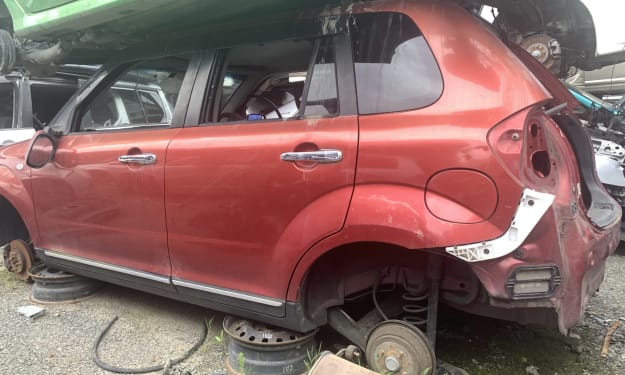The Role of the Automotive Industry in Environmental Pollution
Auto Industry's Impact

The automotive industry has played a pivotal role in shaping the modern world, providing unparalleled mobility and convenience to billions of people worldwide. However, this convenience comes at a significant cost to the environment. The automotive sector is a major contributor to environmental pollution, encompassing air pollution, water contamination, and the depletion of natural resources. In this article, we will delve into the various ways in which the automotive industry impacts the environment and explore potential solutions to mitigate its adverse effects.
1. Air Pollution:
One of the most evident and pressing issues associated with the automotive industry is air pollution. The combustion of fossil fuels, primarily gasoline and diesel, in internal combustion engines releases a cocktail of pollutants into the atmosphere. These pollutants include:
Particulate Matter (PM): Tiny particles suspended in the air that can penetrate deep into the lungs, causing respiratory problems and cardiovascular diseases.
Nitrogen Oxides (NOx): Gases that contribute to smog formation and are linked to respiratory issues, particularly in urban areas.
Carbon Monoxide (CO): A colorless, odorless gas that can be deadly in high concentrations and contributes to the greenhouse effect when released into the atmosphere.
Greenhouse Gases (GHGs): The automotive industry is a significant contributor to the emission of GHGs, primarily carbon dioxide (CO2), which is a major driver of climate change.
2. Water Contamination:
The automotive industry also affects water quality, primarily through the manufacturing process. Vehicle production involves various chemical processes, including painting, coating, and metal treatment, which can lead to the discharge of harmful pollutants into local waterways. These pollutants can include heavy metals, solvents, and oils, posing a threat to aquatic ecosystems and the communities that depend on them.
Additionally, the automotive industry contributes to water pollution indirectly through the use of road vehicles. Rainfall washes pollutants, such as oil, heavy metals, and rubber particles, from road surfaces into stormwater systems, eventually contaminating rivers, lakes, and oceans.
3. Resource Depletion:
The automotive industry relies heavily on the extraction of finite natural resources, such as petroleum for fuel and minerals for vehicle production. The extraction of these resources often results in habitat destruction, soil erosion, and water pollution. Moreover, the manufacturing process itself consumes significant amounts of energy and water, further exacerbating the industry's environmental footprint.
4. Noise Pollution:
In addition to air and water pollution, the automotive industry contributes to noise pollution. The noise generated by vehicles, particularly in urban areas with heavy traffic, has adverse effects on human health, including stress, sleep disturbances, and hearing loss. Noise pollution also disrupts wildlife habitats, affecting animal behavior and communication.
5. Urbanization and Habitat Fragmentation:
The expansion of road networks to accommodate the growing number of vehicles contributes to urbanization and habitat fragmentation. As cities expand to accommodate more cars and infrastructure, natural habitats are often destroyed or fragmented, leading to a loss of biodiversity and disruption of ecosystems.
Mitigating the Environmental Impact:
While the automotive industry has historically been a major contributor to environmental pollution, it is also a vital player in addressing these challenges. Several strategies and technologies can help mitigate the industry's environmental impact:
Fuel Efficiency and Alternative Fuels: Developing and adopting fuel-efficient technologies, including hybrid and electric vehicles, can significantly reduce greenhouse gas emissions. Alternative fuels such as hydrogen and biofuels can also offer more environmentally friendly options.
Emissions Standards: Governments around the world are implementing stricter emissions standards for vehicles. These standards encourage automakers to produce cleaner, more efficient vehicles.
Vehicle Recycling: Proper recycling and disposal of end-of-life vehicles can help reduce waste and promote resource conservation. Just like cash for unwanted cars do in Echuca.
Public Transportation: Encouraging the use of public transportation, carpooling, and cycling can reduce the number of vehicles on the road, thereby decreasing pollution.
Green Manufacturing Practices: Implementing eco-friendly manufacturing processes and materials can reduce water and energy consumption and minimize pollution during production.
Urban Planning: Developing sustainable urban planning strategies can reduce the need for long commutes and promote walkability and public transportation.
Conclusion:
The automotive industry has made significant strides in addressing its environmental impact through technological advancements and regulatory measures. However, the sheer scale of the industry's contribution to pollution necessitates continued efforts to reduce its environmental footprint. By embracing cleaner technologies, sustainable practices, and alternative transportation solutions, the automotive industry can play a more constructive role in protecting the environment and mitigating the adverse effects of pollution.
About the Creator
Enjoyed the story? Support the Creator.
Subscribe for free to receive all their stories in your feed. You could also pledge your support or give them a one-off tip, letting them know you appreciate their work.





Comments (1)
We need less pollution! Well written!